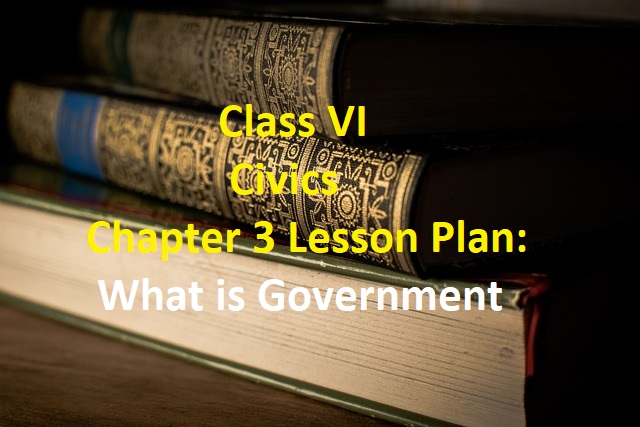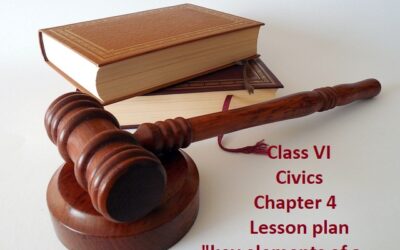Civics Chapter 3 Lesson Plan: What is Government
Class VI Civics Chapter 3 Lesson plan is an activity that a teacher has to perform before the actual teaching takes place. It is the road map for any teacher. Moreover, effective lesson planning provides the students with the necessary structure and direction. It also takes care of the diverse needs of our students. Class VI Civics Chapter 3 Lesson plan provides better resources that are integral to students. This lesson plan of class VI is full of classroom activities that children will enjoy doing. It will also allow teachers to critically reflect on and improve our teaching and learning practice. It ensures every minute of class time in teaching new concepts. Class VI Civics Chapter 3 lesson plan will help you to reach every child with a clear plan in mind.
Civics Chapter 3 Lesson Plan: What is Government
General Objective:
Firstly, to develop interest in the subject.
Secondly, to prepare young learners to participate in civic society.
Thirdly, encourage students to participate in public affairs.
Finally, to provide basic knowledge and understanding of the government to the children.
Specific Objective:
- Initially, Students will acquire knowledge about the system of government.
- Moreover, They will be able to relate the work of government.
Application:
- Firstly, Students will be able to use this knowledge in real-life situations.
- Secondly, They will feel motivated to follow the rules and regulations of their country.
Teaching aids:
Text Book, Black Board, smart board, Globe, PPT.
Checking Previous Knowledge:
At first, the teacher checks the previous knowledge of the students by asking a question.
Now, the teacher introduces the topic by asking basic questions like:
Teacher: Where are you sitting right now?
Student’s response: In the classroom.
Teacher: Who is the monitor of this class?
Student’s answer: Ankita (STUDENTS RESPONSE)
Teacher: What is the role of the monitor in the absence of a teacher?
Student’s answer: to control the class / to mind the class.
Teacher: Then what is the role of a class teacher?
Student’s response: To solve students’ problems in the class.
Teacher: Then what is the role of your Principal?
Student’s response: To look after the whole school?
Teacher: and who looks after the whole country?
Student’s response: Government.
Teacher: What do you mean by Government?
Students are unable to answer this question.
Statement of Topic
Now, the teacher will announce the topic.
Today we are going to study ” what is Government”.
Teaching Method: Interactive
First, the teacher plays an interesting video on the smart board.
Technique:
To begin with, the teacher begins with an Interactive session with common examples.
However, the teacher uses various methods to make the topic interesting by interacting with the children in the class.
By asking very simple questions, the teacher draws the attention of the class.
Finally, also make sure that the children are involved in the discussion.
Therefore, While interacting with the students, the teacher also tells about what is Government.
Content/ Teaching Points:
- Introduction
- Levels of Government: i) Central ii) State, iii) Local Government.
- Laws and the government.
- Types of Government
- i) Monarchy
- ii) Democratic
First Activity: Day 1
Topic: Role of Government
Objective: To understand the various role played by the Government.
Duration: 20 minutes.
Procedure:
- i) Students will be asked to bring a newspaper from home.
- ii) List the activities that the Government is reported to be doing.
- a) ……………………..
- b) ……………………
- c) ……………………
- d) ……………………
Learning outcome:
Finally, Students will learn and understand the various types of work done by Government.
Class VI Geography Chapter 3 Lesson Plan With Activities
Skills Developed:
Observation and thinking skills
It will be a classroom activity that will not be assessed.
Classwork:
- i) Initially, short answer type questions will be done.
- ii) Later on, Long answer type questions will be discussed and done in the class.
Homework:
- i) Draw or paste the image of the Chief Minister of your state.
- ii) Draw or paste the image of the Prime Minister of your country?
Compare their work.
Values imparted:
- To respect differences.
- Understanding the problems faced by the Government.
Multidisciplinary Integrated learning:
- English/Hindi: Write a letter to your CM mentioning the problems you face in your state.
- History: Find out who all were the Prime Ministers of your country.
Assessment Criteria:
Indicators
- Relevance of Content
- Presentation of information gathered
- Awareness of the information gathered
- Creativeness
- Analytical Skills
Learning Outcome:
After the completion of this chapter, students will be able to
- Firstly, understands various terms given in the chapter.
- Secondly, define Government.
- Thirdly, get familiar with types of Government.
- Finally, explain the role played by State and Central Government.
Remedial Measure:
Extra Class
The teacher asks the slow learners to stay after school hours for personal attention.
Class VI History Chapter 4 Lesson Plan: What Books and Burials Tell Us
Civics Chapter 3 Lesson Plan: What is Government
Conclusion:
I hope the Class VI Civics Chapter 3 Lesson Plan of class VI will be of great help to the new teachers.
Did you conduct any activity given in the Class VI Civics Chapter 3 Lesson Plan.
Kindly share your experience. Pl. do not hesitate to write to me.
Your comments act as a feedback for me.
At last, I request you to comment and subscribe.
So that, you get the notification of the next lesson plan.
Class VI Civics Chapter 2 Lesson Plan
Class VI History Chapter 3 Lesson Plan – In the Earliest Cities
Was this lesson plan helpful to you? Write your views in the comment box.





0 Comments